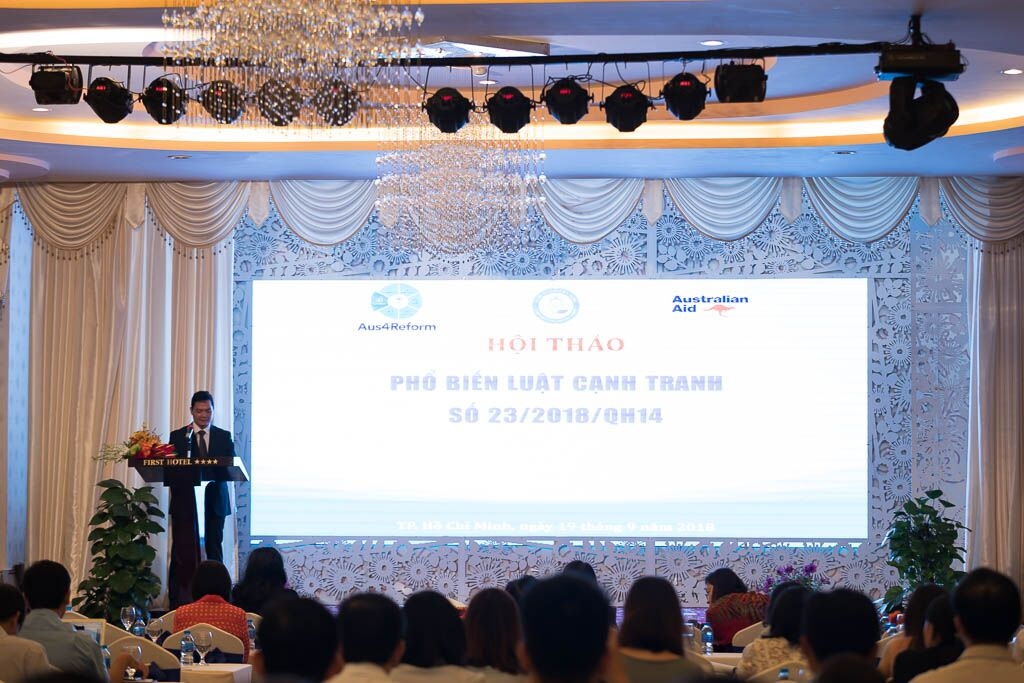Vietnam amends Competition Law to better manage cross-border deals
 |
| Experts shared thoughts at the workshop to disseminate the Law on Competition 2018 in Ho Chi Minh City |
The amended Competition Law, which is slated to take effect on July 1, 2019, covers lots of progressive provisions attuned to international best practices. Compared to the Law on Competition 2004, the new law is based on a combination of economic and legal ideas to increase the effectiveness of enforcement.
One of these is changing the approach to economic concentration. Accordingly, economic concentration is no longer considered an anti-competitive act per se. Controlling economic concentration will be based on assessing its impact on competition instead of notification requests and limiting the combined market shares of involved parties.
According to Tran Phuong Lan, head of the Economic Concentration Control Department under the Vietnam Competition Authority (VCA), the amended law expands government to all transactions and forms of economic concentration that take place outside of Vietnam, but have anti-competitive effects on the Vietnamese market.
Lan cited the acquisition of the Big C and Metro supermarket chains that caused concerns among stakeholders in the retail market about possible anti-competitive impacts. The Law on Competition 2004 controls economic concentration only on the basis of combined market share. Thus, the mergers and acquisitions (M&A) cases of Big C and Metro are not prohibited by the old law, because their combined market shares remain below the market threshold.
“However, similar transactions taking place from July 1, 2019 will be dealt with in accordance with the Competition Law 2018. There will be evaluations and suitable measures to ensure a fair and healthy competitive environment as well as protect the relevant stakeholders in the market,” she said, noting that the VCA would join forces with foreign organisations to investigate cross-border M&A deals.
In addition, the 2004 Competition Law uses only a single criterion to control economic concentration, which is the relevant market threshold. It prohibits economic concentrations where the combined market share on the relevant market exceed 50 per cent. Enterprises, which have 30-50 per cent of the relevant market must notify the competition agency prior to implementing such an economic concentration.
Lan said that it is quite difficult for enterprises to calculate the market share when they do not know the total revenue of all players in the market. Therefore, the amended law introduces more criteria, including total assets, total revenue, deal value, and combined market share of the involved parties.
“The move aims to make it easier for enterprises to understand when they need to notify the authorities. However, the provisions do not apply to small and medium-sized enterprises (SMEs) and specific cases like Grab’s acquisition of Uber’s Southeast Asia operations, including Vietnam,” she said.
The amended law also prohibits practices which have or may potentially restrict competition. Phung Van Thanh, deputy head of the Department of Investigation of Anti-Competitive Behaviour under the VCA, stressed if enterprises entered into a cartel arrangement to increase prices, it would affect millions of consumers in Vietnam.
“However, there are some exceptions, like exporters taking part in a cartel to raise prices in overseas markets to generate more revenue and jobs for Vietnam, or a group of domestic television stations negotiating to get the best price on broadcasting rights for international sports programmes,” Thanh said.
Vietnam’s Competition Law 2018 is based on Australian experience and was developed with support from the "Australia Supports Economic Reform in Vietnam" programme (Aus4Reform). The Aus4Reform programme, sponsored by the Australian Department of Foreign Affairs and Trade, is worth $6.5 million and is deployed from 2017 to 2021.
What the stars mean:
★ Poor ★ ★ Promising ★★★ Good ★★★★ Very good ★★★★★ Exceptional
 Tag:
Tag:
Related Contents
Latest News
More News
- Vietnamese businesses diversify amid global trade shifts (February 03, 2026 | 17:18)
- Consumer finance sector posts sharp profit growth (February 03, 2026 | 13:05)
- Vietnam and US to launch sixth trade negotiation round (January 30, 2026 | 15:19)
- NAB Innovation Centre underscores Vietnam’s appeal for tech investment (January 30, 2026 | 11:16)
- Vietnam moves towards market-based fuel management with E10 rollout (January 30, 2026 | 11:10)
- Vietnam startup funding enters a period of capital reset (January 30, 2026 | 11:06)
- Vietnam strengthens public debt management with World Bank and IMF (January 30, 2026 | 11:00)
- PM inspects APEC 2027 project progress in An Giang province (January 29, 2026 | 09:00)
- Vietnam among the world’s top 15 trading nations (January 28, 2026 | 17:12)
- Vietnam accelerates preparations for arbitration centre linked to new financial hub (January 28, 2026 | 17:09)






















 Mobile Version
Mobile Version